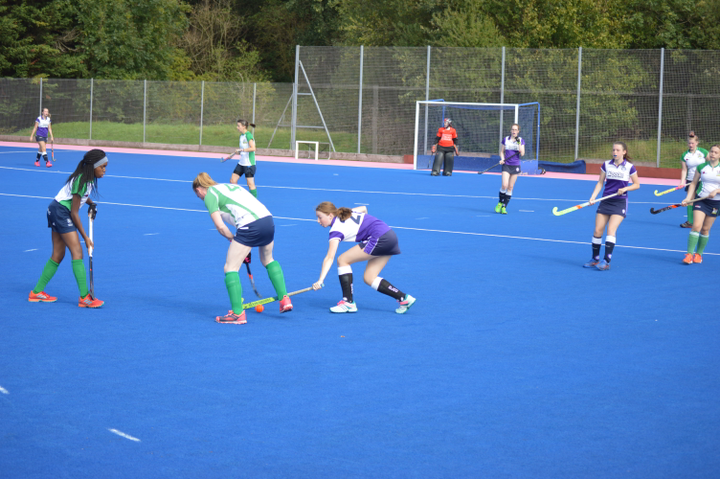- Community
How Old Loughtonians Are Keeping Connected Through Lockdown

The tightening of tier restrictions followed by the onset of a third national lockdown has hit hockey clubs across the country hard. Leagues and competitions have ground to a halt, despite the best efforts of everyone to keep things going; holiday camps have had to be cancelled; training has ceased.
During the first lockdown online training and online courses were brought into use, demonstrating the hockey community’s ability to adapt and innovate. Online fitness activities, Zoom coffee mornings between team mates and brushing up on areas of coaching and umpiring that could be delivered online were among the variety of ways that technology was employed to maintain a sense of togetherness.
One club has taken the third lockdown period to dive a little deeper into that sense of togetherness within a club, using social media to engage with the club members on both short-term campaigns and to form a strategy to drive long-term changes within the team.
It is a process that started last Autumn, but which has gathered pace in recent months. At Old Loughtonians Hockey Club, a committee of eight people from across the range of club members has been formed with a brief to develop a positive culture around the club – focusing on equality, diversity, inclusivity and belonging- which came as a direct response to concerns over racial discrimination.
Matt Smylie is one of the committee members and he explains that there are some things that are taking place immediately, while others will take a little longer to put in place.
“We have launched Red January within the club,” he says, “which is already gaining traction, with more than 30 people signed up.”
Red January is a mental wellbeing sports initiative that encourages people to get active every day throughout January. At Old Loughtonians the club has encouraged members to download the Strava app which records time spent exercising and the amount of energy expended. The club members are signing up to a club challenge to log the most energy spent - whatever the activity.
“We knew we wouldn’t get a full uptake because it is a new idea but hopefully it will provide a foundation for future campaigns,” says Matt. “We didn’t want to set a challenge that was too specific because people have different needs and do different activities. So our elite players might decide to join in a ‘fastest five kilometre challenge’, but other members might concentrate on overall distance or time spent exercising. We have one member who is doing a series of HITT routines and dance classes, which all count.”
With two of the committee members involved in mental health professionally, the importance of physical activity to mental health is well recognised. The information that the committee shared about Red January also contained links to several mental health organisations so people knew where to go to for help.
As Matt says, “even if it helps one person, it is worth it.”
A second campaign that would have taken place in February was Rainbow Laces, in support of LGBT+. But, as Matt says, with no hockey activity, this highly visual campaign may now have to be postponed until players return to the pitch.
Another immediate action the committee has launched is a survey to all club members. Led by Pranitha De Souza, this will provide the benchmark for future work. The survey seeks to explore what people think of the club, its policies and how it deals with issues such as discrimination, exclusion and bullying.
Even before the results of the survey are in, the club is setting up an anonymous hotline where people can email in their concerns. This will allow incidents to be brought up in a confidential and directed manner.
In the coming weeks and months the club is running education courses for coaches and umpires that look at things such as unconscious bias within the sports environment. The club’s education policy is led by Stuart Hurwitz and will be exploring a number of ways to spread the message of diversity across its membership. For example, one club member, Karen Sticher, is the CEO of a Learning and Development company and will be working with club members to allow them to deliver diversity and inclusivity training.
Next season, in a project led by committee member Anna Dingle, the Essex club will be launching a series of outreach programmes in local state schools. And chair of the group, Simon Beckley, is hoping to re-ignite a partnership with Arsenal Football Club. In this programme in recognition of the shared skills and games awareness between the two sports, Arsenal Foundation coaches signpost children to the hockey club. Former England international Darren Cheesman is a success story from this partnership in its previous iteration.
Also, from the start of next season, the club’s youth teams will be presented with a talk on expected behaviours and club values. The ambition is quite clear, Old Loughts want to become a beacon club for inclusivity and diversity.
“In some ways the lockdown has afforded us new opportunities”, says Matt. “It has slowed things down. Two of our committee members, Gurmit Dhillon and Bob Narwal, are coaches, so they have been able to spend more time working with us on what needs to be done to make the playing and coaching environment more inclusive.
“As a group, we are very energetic about achieving our aims and are delighted with club members’ early responses to make Old Loughts great both on and off the pitch.”
